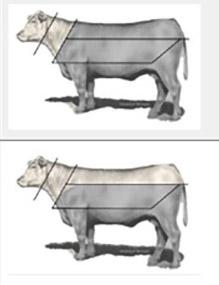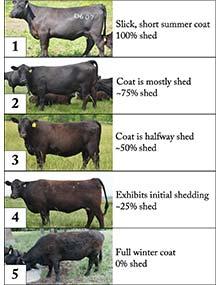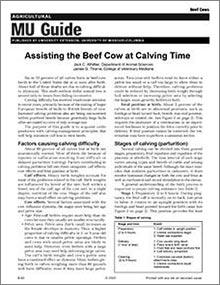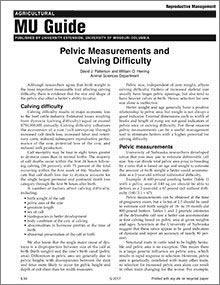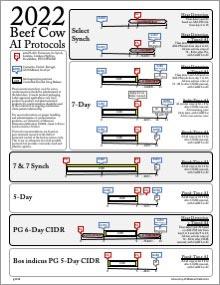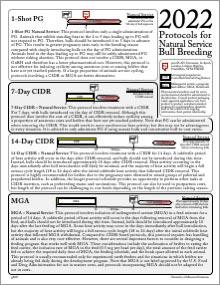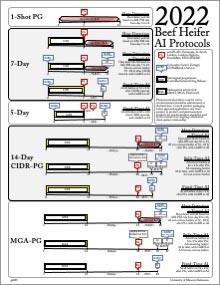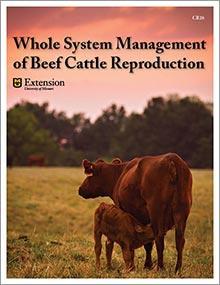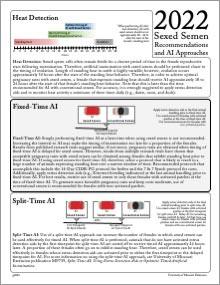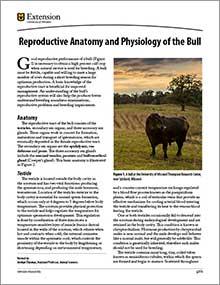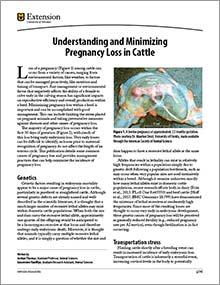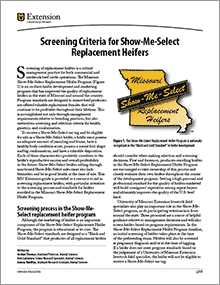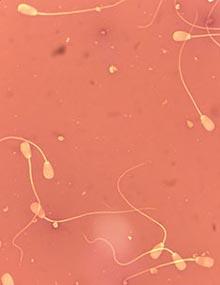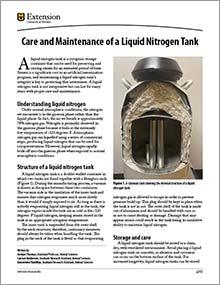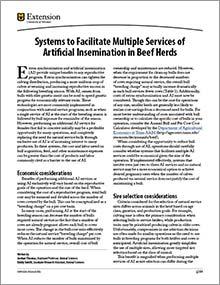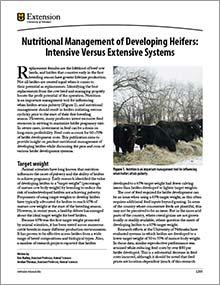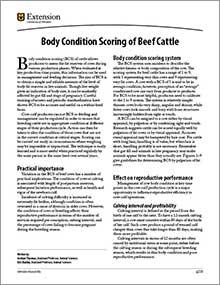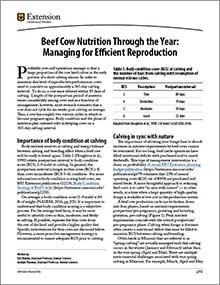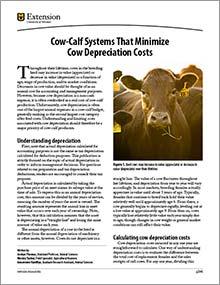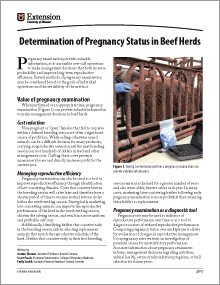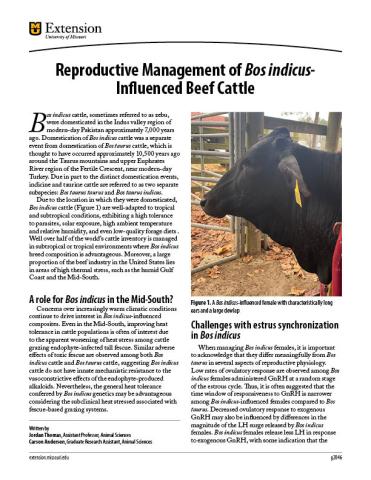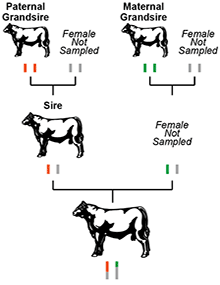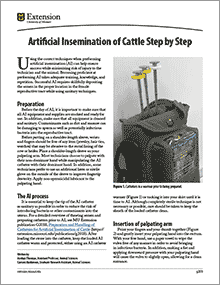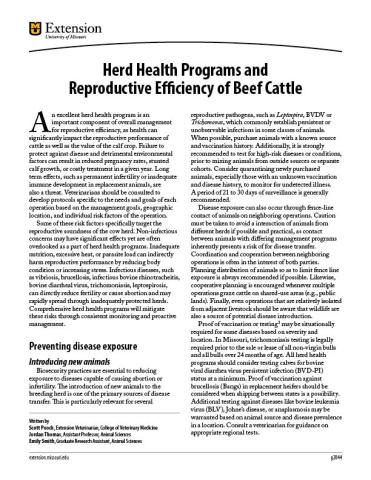The following publications cover topics related to Mizzou Repro — Reproductive Management of Beef Cattle. For a complete list of MU Extension publications, visit the main Publications page.
How to Use the Hair Shedding Scale
New
Hair shedding scores represent a visual appraisal of the extent an animal has shed their winter coat. This MU Extension guide is meant to provide further detail and guidance on hair shed scoring animals.
Hair Shedding Scores: A Tool to Select Heat Tolerant Cattle
Revised
Learn how hair shedding scores can help select heat-tolerant cattle, improving productivity and adaptability in challenging environments.
Adding Value to Show-Me-Select Replacement Heifers Using Show-Me-Plus
New
This MU Extension guide serves as a resource for producers interested in participating in Show-Me-Plus, including information on the importance of genomic testing and its ability to identify genetic variability and ultimately potential for profitability.
Assisting the Beef Cow at Calving Time
Reviewed
Six to 10 percent of all calves born in beef cow herds in the U.S. die at or soon after birth. About half of those deaths are due to calving difficulty (dystocia). The purpose of this guide is to acquaint cattle producers with calving management principles that will help minimize calf loss in their herds.
Pelvic Measurements and Calving Difficulty
Reviewed
Learn how pelvic measurements can help estimate calf birth weight and reduce calving difficulty in beef cattle.
Estrus Synchronization Recommendations for Artificial Insemination of Beef Cows
Revised
Learn about Select Synch, 7-Day CO-Synch + CIDR, 7 & 7 Synch, 5-Day CO-Synch + CIDR, PG 6-Day CIDR, and Bos indicus PG 5-Day CIDR estrus synchronization protocols for artificial insemination of beef cows in this University of Missouri Extension guide.
Estrus Synchronization Recommendations for Natural Service Bull Breeding
Revised
Learn about simple synchronization protocols the can be used effectively with natural service bull breeding that capture some benefits of estrus synchronization without the need to adopt an artificial insemination program in this MU Extension guide.
Estrus Synchronization Recommendations for Artificial Insemination of Beef Heifers
Revised
Learn about recommended protocols for artificial insemination of beef heifers using 1-Shot PG, 7-Day CO-Synch + CIDR, 5-Day CO-Synch + CIDR, 14-Day CIDR-PG, and MGA-PG in this University of Missouri Extension guide.
Whole System Management of Reproduction in Beef Cattle
Revised $45
By managing reproduction with a multiyear perspective and taking a whole system approach, beef cattle producers can manage both proactively and reactively to achieve profitable, sustainable reproductive outcomes. Learn more in this comprehensive manual.
Sexed Semen for Artificial Insemination: Recommendations and AI Approaches
Revised
Learn about using sexed semen in a planned mating of cattle and how it differs from conventional semen. Heat detection, fixed-time artificial insemination and split-time AI approaches are described in this University of Missouri Extension guide.
Reproductive Anatomy and Physiology of the Bull
Revised
Good reproductive performance of a bull is necessary to obtain a high percent calf crop when natural service is used for breeding. Gain a basic knowledge of the reproductive tract and an understanding of the bull’s reproductive system in this guide.
Determining Reproductive Fertility in Herd Bulls
Revised
Learn how to assess and enhance bull fertility through breeding soundness evaluations, puberty indicators, and nutrition strategies.
Care and Maintenance of a Liquid Nitrogen Tank
Revised
Semen is a significant cost in a cattle artificial insemination program. Maintaining a liquid nitrogen tank’s integrity is key to protecting that investment. Learn how to properly care for and maintain a liquid nitrogen tank in this MU Extension guide.
Systems to Facilitate Multiple Services of Artificial Insemination in Beef Herds
New
Learn efficient systems for artificial insemination in beef herds to improve reproductive success and manage costs effectively.
Body Condition Scoring of Beef Cattle
New
Assess beef cattle fat reserves using a 1–9 body condition scoring system to inform feeding and management decisions throughout the production cycle.
Determination of Pregnancy Status in Beef Herds
New
Pregnancy examination provides valuable information that enables cow-calf operations to make management decisions that increase profitability and improve long-term reproductive efficiency. Learn about several methods in this MU Extension guide.
Reproductive Management of Bos indicus-Influenced Beef Cattle
New
Bos indicus cattle present challenges with estrus synchronization. Learn about the timing of estrus onset for them, their susceptibility to stress, and considerations and expectations when breeding them in this University of Missouri Extension guide.
The Random Shuffle of Genes: Putting the E in EPD
Reviewed
Understanding EPD variability: how genetic shuffling during reproduction leads to differences among full siblings in cattle.
Artificial Insemination of Cattle Step by Step
New
Using correct techniques when performing artificial insemination on beef cattle can help ensure success and minimizing risk of injury. Learn how to deposit the semen in the proper location in the female reproductive tract while using sanitary techniques.
Herd Health Programs and Reproductive Efficiency of Beef Cattle
New
Comprehensive herd health programs enhance reproductive efficiency in beef cattle by addressing disease prevention, nutrition, and environmental stressors.
